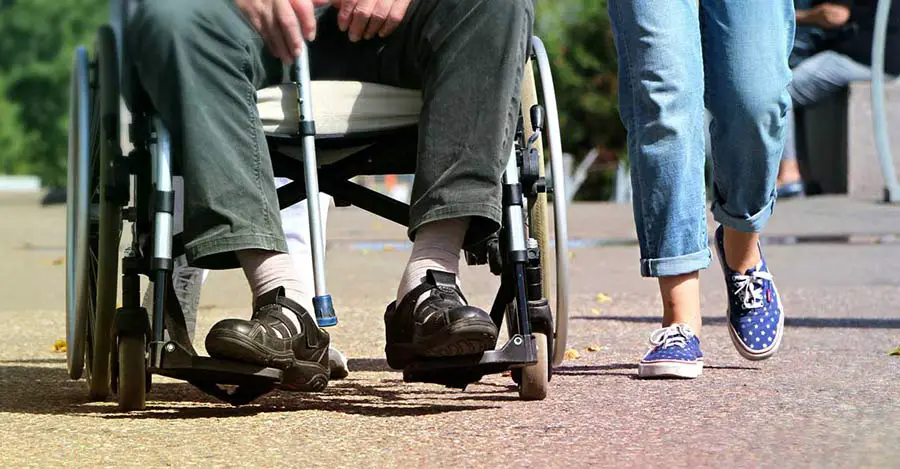Will Crutches Help My Fibromyalgia ?
Worldwide, people with this medical condition ask themselves, “will crutches help my fibromyalgia?” The short answer is that yes. Crutches are a treatment option that actually manages mobility issues. Continue reading if you would like to find out more about what caused it, and the treatment option. Additionally, keep reading if you want to know more about crutches as a treatment.
What is Fibromyalgia?
Fibromyalgia is a medical disorder. It is a condition that creates widespread musculoskeletal pain. Fibromyalgia affects approximately every 1 in 25 people in the United Kingdom. Unlike other disorders, this is a long-term chronic illness that can impact a person’s life.
Symptoms
Due to this being a chronic condition, there are many symptoms that people suffer from. Finding out these symptoms early on can help you establish if you have this condition. I try my best to educate others on the symptoms so that they can seek medical help and get a diagnosis early on.
When identifying the condition, medical doctors would look for trigger points. Yet, they now look for pain regions. A doctor will likely ask you if you have persistent dull pain in one or more of these regions of pain. If you tell the doctor that you feel this type of pain, they will consider a fibromyalgia diagnosis. Yet, only if you are experiencing pain in 4 out of the 5 regions identified as part of the diagnostic criteria.
The more awareness there is about this disorder, the more likely it will be that people take notice. If they are aware of, they can take time to discover other treatment options and a potential cure. Below is a shortened list of a few symptoms associated with fibromyalgia.

- Headaches and migraines.
- Insomnia and restless sleep patterns.
- Mild to severe muscle pain that includes burning, tightness and twitching.
- Extreme and constant fatigue and tiredness.
- Widespread pain throughout your musculoskeletal regions of the human body.
- Trouble concentrating.
- Bladder and bowel problems.
- Anxiety and depression.
Causes
We can look at what causes this disorder. There has been much debate globally surrounding the exact cause of this condition. Despite several research studies into it, it is still unclear what the exact cause is.
Yet, recently there is much evidence based on a few theories about the causes of fibromyalgia. Most medical professionals agree on a popular view. They state the disorder develops in people who have problems with how their spinal cord and brain process pain signals from their body’s nerves.

- Past infections: Those who suffer from past infections are more likely to get it. For example, those who had salmonella have later in life developed fibromyalgia.
- Stress and mood disorders: Stress is often referred to as the silent killer. It can significantly affect body’s functions. Some research has linked stress as a factor to those who have developed fibromyalgia. This is because stress creates hormonal imbalances.
- Hereditary condition: Similarly to other genetic disorders, fibromyalgia runs in families. If you have a family member who has the condition, you are more likely to get it. Some scientists believe this is because of gene mutations.
Additionally, you are more prone to developing fibromyalgia if you are a woman. You are also more likely to develop this condition if you lead a sedentary lifestyle. Moreover, if you suffer from post-traumatic stress disorder or have another disease.
Treatment
We will briefly discuss a few of the treatment options currently available. The loved one in my life suffering from this condition has made use of a few of these options. There is, unfortunately, no cure for the disorder currently. Yet, by utilizing one or more of these treatments, a person can ease some of their pain.
How Do You Treat Fibromyalgia Pain ?

- Various pain relievers: You can manage fibromyalgia with over-the-counter pain medications. Pain medications help reduce inflammation and muscular pains. Some will also help you sleep. Some of the more popular medicines include aspirin, naproxen sodium, and ibuprofen.
- Acupuncture: For years, the practice of acupuncture has been helping those with illnesses. Acupuncture has started to be more widely used by those with fibromyalgia. This form of treatment involved a patient’s skin being stuck with needles to provide pain relief.
- Physical therapy: One of the best treatments available is physical therapy. This treatment will focus on you gaining back mobility and strengthening weakening muscles. As your mobility increases and your muscles strengthen, you will have less pain.
How Can You Treat Fibromyalgia Fatigue?

- Medicinal marijuana: Medicinal marijuana is one of the best natural pain supplements. It is also one of the best muscle relaxants and sleeping aids for those with fibromyalgia. It may not be traditional pain relief, but it is becoming more popular. It helps those with the condition improve their mental health. It also helps them reduce their pain and stiffness.
- Vitamin D supplements: You should always speak with your doctor before taking any kind of medication. Vitamin D supplements ease fatigue with those who have fibromyalgia. If you want to combat fatigue and feel better, you might want to take a vitamin D supplement.
- Meditation: Many people with this condition have stated that meditation helps them. Meditation will help you control your anxiety and depression. These are common symptoms felt by those with this disorder.
Will Crutches Really help help my Fibromyalgia?

Crutches are one of the reliable pain management treatments available to those who have fibromyalgia. Above, we said how you could treat the pain and fatigue that those diagnosed feel. We will briefly discuss how crutches can help you with the mobility issues you could be facing if you have fibromyalgia.
Crutches will support you and assist you with walking. This is especially useful when you are in a lot of pain due to the disorder. It’s best to use your crutches when you begin experiencing the pain so that your pain doesn’t worsen. Instruments like crutches are specifically designed to reduce the pressure a body feels when walking. This is helpful to those who have fibromyalgia as they often experience widespread discomfort.
Help Tips
Below I have gathered a few helpful tips for living with this condition from those who have it. Some of these tips will help reduce some of the pain you are likely experiencing and help you live a happy life.

- Undertake yoga classes. Along with light exercise, taking a yoga class can help manage the pain you experience. Yoga is a relaxing sport that will not only quiet your mind but strengthen your muscles. This will help improve your body’s mobility.
- Alternate your medications. If you find the medicine you are taking isn’t working for you, change to something else. Often the treatment for one patient won’t work for someone else with the condition. Additionally, keep a note of all the medications that leave you with bad reactions. This way, you know what to avoid.
- Never compare yourself to others with the condition. It is easy to compare yourself to those with the same disorder. You should not do this as each person tolerates and experiences pain in various ways. Additionally, each person copes and manages their condition differently. There are also different levels of normal for other people. By not comparing yourself to someone else, you are helping yourself cope.
Final Words
After reading this brief article detailing fibromyalgia, you should have a better understanding. I truly hope the information will help others identify if this is a disorder they are suffering from. I also hope that this article will provide readers with helpful tips and treatments. These tips could help reduce the pain they likely feel daily.
If you are looking for variable treatments to manage your pain, you might want to consider using crutches. These mobility aids are convenient, functional and assist those living with this condition.
